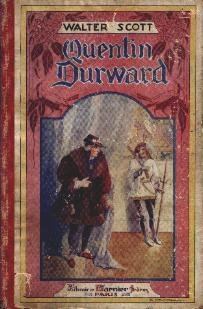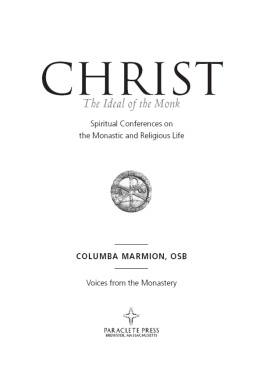MARMION:
A TALE OF FLODDEN FIELD
IN SIX CANTOS
BY
SIR WALTER SCOTT
EDITED
WITH INTRODUCTION AND NOTES
BY THOMAS BAYNE
Sir Walter Scotts love of the country induced him, after his marriage in 1797, to settle in a cottage at the pretty village of Lasswade, near Edinburgh. Four years after leaving this district he took Mr. Morritt of Rokeby to see the little dwelling, telling him that, though not worth looking at, it was our first house when newly married, and many a contrivance it had to make it comfortable. He then enumerated various devices, by which he had secured for Mrs. Scott and himself what seemed to both, at the time, additional convenience and elegance in and about their home. His reminiscences culminated in an account of an arch over the gate-way, which he had constructed by fastening together the tops of two convenient willows and placing above them a cross made of two sticks. This is very beautiful and characteristic; and there is much freshness and charm in the further picture of the young cottagers rejoicing over the success of the arrangements. To be sure, Scott concluded, it is not much of a lion to show a stranger; but I wanted to see it again myself, for I assure you after I constructed it, Mamma (Mrs. Scott) and I both of us thought it so fine, we turned out to see it by moonlight, and walked backwards from it to the cottage-door in admiration of our own magnificence and its picturesque effect. It was his way to invest his circumstances with an interest over and above what intrinsically belonged to them, and to prompt his friends to a share in his delight.
When, in 1804, Scott was appointed Sheriff of Selkirkshire, a condition attaching to his post was that he should reside during part of the year within the bounds of his sheriffdom. He then removed from Lasswade, and settled at Ashestiel on the Tweed, seven miles from Selkirk. This is his own account of the new home:
We found a delightful retirement, by my becoming the tenant of my intimate friend and cousin-german, Colonel Russell, in his mansion of Ashestiel, which was unoccupied during his absence on military service in India. The house was adequate to our accommodation, and the exercise of a limited hospitality. The situation is uncommonly beautiful, by the side of a fine river, whose streams are there very favourable for angling, surrounded by the remains of natural woods, and by hills abounding in game. In point of society, according to the heartfelt phrase of Scripture, we dwelt amongst our own people; and as the distance from the metropolis was only thirty miles, we were not out of reach of our Edinburgh friends, in which city we spent the terms of the summer and winter Sessions of the Court, that is, five or six months in the year.
The functions of the Sheriff of Selkirkshire admitted of considerable leisure, and Scott settled at Ashestiel full of literary projects, as well as heartily prepared to meet his new responsibilities and to add to his numerous and valuable friendships. An enterprise that early engaged his attention was a complete edition of the British poets, but the deliberations on the subject came to nothing except in so far as they helped towards the preparation of Campbells Specimens of the British Poets, which appeared in 1819. Writing Scott regarding his project of a complete edition of the poets, his friend George Ellis said, Much as I wish for a corpus poetarum, edited as you would edit it, I should like still better another Minstrel Lay by the last and best Minstrel; and the general demand for the poem seems to prove that the public are of my opinion. The work of editing, however, he seemed at the time determined on having, and he finally abandoned the idea of an exhaustive issue of the British poetry previous to his own time and settled down to edit Dryden. This was a work much needed, and Scott did it extremely well, as may be seen by comparing his own issue of Drydens Life and Works in 1808 with the recent reproduction of it, admirably edited by Mr. George Saintsbury.
He had likewise, as he mentions in the General Preface to the Novels, begun Waverley about 1805, and other literary engagements received their share of attention. He wrote articles for the Edinburgh Review, besides doing such minor if useful literary service as editing for Constable Original Memoirs written during the Great Civil Wars, and so on. At the same time, there were prospects of professional advancement, an account of which he gives in the following terms, in the 1830 Introduction to Marmion:
An important circumstance had, about the same time, taken place in my life. Hopes had been held out to me from an influential quarter, of a nature to relieve me from the anxiety which I must have otherwise felt, as one upon the precarious tenure of whose own life rested the principal prospects of his family, and especially as one who had necessarily some dependence upon the favour of the public, which is proverbially capricious; though it is but justice to add, that, in my own case, I have not found it so. Mr. Pitt had expressed a wish to my personal friend, the Right Hon. William Dundas, now Lord Clerk Register of Scotland, that some fitting opportunity should be taken to be of service to me; and as my views and wishes pointed to a future rather than an immediate provision, an opportunity of accomplishing this was soon found. One of the Principal Clerks of Session, as they are called, (official persons who occupy an important and responsible situation, and enjoy a considerable income,) who had served upwards of thirty years, felt himself, from age, and the infirmity of deafness with which it was accompanied, desirous of retiring from his official situation. As the law then stood, such official persons were entitled to bargain with their successors, either for a sum of money, which was usually a considerable one, or for an interest in the emoluments of the office during their life. My predecessor, whose services had been unusually meritorious, stipulated for the emoluments of his office during his life, while I should enjoy the survivorship, on the condition that I discharged the duties of the office in the meantime. Mr. Pitt, however, having died in the interval, his administration was dissolved, and was succeeded by that known by the name of the Fox and Grenville Ministry. My affair was so far completed, that my commission lay in the office subscribed by his Majesty; but, from hurry or mistake, the interest of my predecessor was not expressed in it, as had been usual in such cases. Although, therefore, it only required payment of the fees, I could not in honour take out the commission in the present state, since, in the event of my dying before him, the gentleman whom I succeeded must have lost the vested interest which he had stipulated to retain. I had the honour of an interview with Earl Spencer on the subject, and he, in the most handsome manner, gave directions that the commission should issue as originally intended; adding, that the matter having received the royal assent, he regarded only as a claim of justice what he would have willingly done as an act of favour. I never saw Mr. Fox on this, or on any other occasion, and never made any application to him, conceiving that in doing so I might have been supposed to express political opinions contrary to those which I had always professed. In his private capacity, there is no man to whom I would have been more proud to owe an obligation, had I been so distinguished.
By this arrangement I obtained the survivorship of an office, the emoluments of which were fully adequate to my wishes; and as the law respecting the mode of providing for superannuated officers was, about five or six years after, altered from that which admitted the arrangement of assistant and successor, my colleague very handsomely took the opportunity of the alteration, to accept of the retiring annuity provided in such cases, and admitted me to the full benefit of the office.












